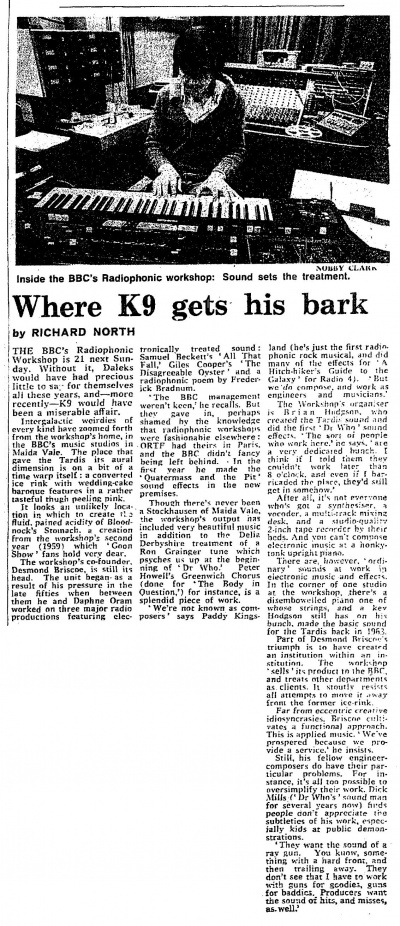Where K9 gets his bark
- Publication: The Observer
- Date: 1979-03-25
- Author: Richard North
- Page: 4
- Language: English
THE BBC's Radiophonic Workshop is 21 next Sunday. Without it, Daleks would have had precious little to say for themselves all these years, and--more recently—-K9 would have been a miserable affair.
Intergalactic weirdies of every kind have zoomed forth from the workshop's home, in the BBC's music studios in Maida Vale. The place that gave the Tardis its aural dimension is on a bit of a time warp itself : a converted ice rink with wedding-cake baroque features in a rather tasteful thugh peeling pink.
It looks an unlikely location in which to create the fluid, pained acidity of Bloodnock's Stomach, a creation from the workshop's second year (1959) which ' Goon Show' fans hold very dear.
The workshop's co-founder, Desmond Briscoe, is still its head. The unit began as a result of his pressure in the late fifties when between them he and Daphne Oram worked on three major radio productions featuring electronically treated sound : Samuel Beckett's 'All That Fall,' Giles Cooper's 'The Disagreeable Oyster' and a radiophonic poem by Frederick Bradnum.
'The BBC management weren't keen,' he recalls. But they gave in, perhaps shamed by the knowledge that radiophonic workshops were fashionable elsewhere: ORTF had theirs in Paris, and the BBC didn't fancy being left behind. In the first year he made the 'Quatermass and the Pit' sound effects in the new premises.
Though there's never been a Stockhausen of Maida Vale, the workshop's output has included very beautiful music in addition to the Delia Derbyshire treatment of a Ron Grainger tune which psyches us up at the begining of 'Dr Who.' Peter Howell's Greenwich Chorus (done for 'The Body in Question,') for instance, is a splendid piece of work.
'We're not known as composers' says Paddy Kingsland (he's just the first Radiophonic rock musical, and did many of the effects for 'A Hitch-hiker's Guide to the Galaxy' for Radio 4). 'But we do compose, and work as engineers and musicians.'
The Workshop's organiser is Brian Hodgson, who created the Tardis sound and did the first 'Dr Who' sound effects. 'The sort of people who work here,' he says, 'are a very dedicated bunch. I think if I told them they couldn't work later than 8 o'clock, and even if I barricaded the place, they'd still get in somehow.'
After all, it's not everyone who's got a synthesiser, a vocoder, a multi-track mixing desk, and a studio-quality 2-inch tape recorder by their beds. And you can't compose electronic music at a honky-tonk upright piano.
There are however, 'ordinary' sounds at work in electronic music and effects. In the corner of one studio at the workshop, there's a disembowelled piano one of whose strings, and a key Hodgson still has on his bunch, made the basic sound for the Tardis back in 1963.
Part of Desmond Briscoe's triumph is to have created an institution within an institution, The workshop 'sells' its product to the BBC, and treats other departments as clients. It stoutly resists all attempts to move it away front the former ice-rink.
Far from eccentric creative idiosyncrasies. Briscoe cultivates a functional approach. This is applied music, 'We've prospered because we provide a service,' he insists.
Still, his fellow engineer-composers do have their particular problems. For instance, it's all too possible to oversimplify their work. Dick Mills ('Dr Who's' sound man for several years now) finds people don't appreciate the subtleties of his work, especially kids at public demonstrations.
'They want the sound of a ray gun. You know, something with a hard front, and then trailing away. They don't see that I have to work with guns for goodies, guns for baddies. Producers want the sound of hits, and misses, as well.
Caption: Inside the BBC's Radiophonic workshop: Sound sets the treatment.
Disclaimer: These citations are created on-the-fly using primitive parsing techniques. You should double-check all citations. Send feedback to whovian@cuttingsarchive.org
- APA 6th ed.: North, Richard (1979-03-25). Where K9 gets his bark. The Observer p. 4.
- MLA 7th ed.: North, Richard. "Where K9 gets his bark." The Observer [add city] 1979-03-25, 4. Print.
- Chicago 15th ed.: North, Richard. "Where K9 gets his bark." The Observer, edition, sec., 1979-03-25
- Turabian: North, Richard. "Where K9 gets his bark." The Observer, 1979-03-25, section, 4 edition.
- Wikipedia (this article): <ref>{{cite news| title=Where K9 gets his bark | url=http://cuttingsarchive.org/index.php/Where_K9_gets_his_bark | work=The Observer | pages=4 | date=1979-03-25 | via=Doctor Who Cuttings Archive | accessdate=26 December 2025 }}</ref>
- Wikipedia (this page): <ref>{{cite web | title=Where K9 gets his bark | url=http://cuttingsarchive.org/index.php/Where_K9_gets_his_bark | work=Doctor Who Cuttings Archive | accessdate=26 December 2025}}</ref>
